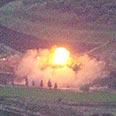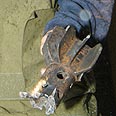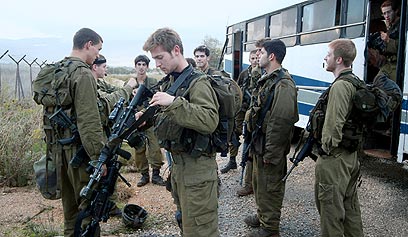

The Israel Air Force attacked a Hizbullah post in southern Lebanon Monday night, in wake of an earlier Hizbullah attack on IDF posts in northern Israel.
The IDF also demolished a Hizbullah post north of the village of Rajar, half of which is is located in Israel, and the other half in Lebanon.
Defense Minister Shaul Mofaz approved Monday a series of strikes in southern Lebanon in response to the large-scale offensive on the northern border that left 19 Israeli wounded and five Hizbullah members dead.
Meanwhile, residents of the northern town of Kirayat Shmona were allowed to leave their shelters and return to their daily routines.
Schools in the town are expected to operate Tuesday as normal.
The residents of several communities in the eastern sector of Israel's northern border also spent the night in shelters.
During a meeting with security officials Monday evening called to assess the outbreak of violence, Mofaz said the latest escalation is a result of the pressure exerted on Syria over the assassination of former Lebanese Prime Minister Rafik al-Hariri, as well as international pressure on the Hizbullah.
“The Hizbullah action is an attempt to draw Israel into an escalation and divert attention to our region,” he said.
Mofaz also lauded IDF troops stationed on the northern border and said their “wise actions” thwarted an attempt to abduct soldiers. According to the defense minister, the Hizbullah operation was planned carefully and took a while to prepare.
According to Mofaz, Hizbullah may attempt more attacks, including abductions of soldiers, in the near future. The minister instructed the army to remain alert and review procedures meant to foil abductions. Mofaz also called for action on the diplomatic front and asked that details of Monday’s Hizbullah offensive be relayed to the United States, Egypt, and the European Union, in an effort to prompt pressure on the Lebanese government to curb attacks from its territory.
Mofaz also recommended that an official complaint be filed with the United Nations Security council.
Meanwhile, IDF sources said Hizbullah ahs been facing heavy pressure recently aimed at ending its existence as an armed group. Accordingly, the Lebanese group is attempting to stir trouble in order to create legitimacy for its action through false claims, the sources said.
IDF Northern Command Head Udi Adam confirmed that forces thwarted an attempted abduction and noted that Hizbullah used “all weapons available in its arsenal, including rockets, anti-tank weapons, mortars, light weapons, and sniper fire.”

IDF troops on northern border (Photo: Avihu Shapira)
A senior IDF officer told Ynet Monday’s events show the Hizbullah is again spitting in the face of Lebanon’s government by “carrying out such operation on the eve of the Lebanese Independence Day.”
‘Elite Hizbullah unit’
Chief of Staff Lieutenant General Dan Halutz held a situation analysis meeting in the wake of Monday’s clashes, described as the worst outbreak of violence on the northern border since the IDF's exit from Lebanon over five years ago.
Despite the large number of injuries, the IDF concluded that the attack was thwarted, and Hizbullah's original plan to kidnap IDF soldiers on the Israeli side of the village of Rajar was prevented.
Hizbullah apparently sent an elite unit that was engaged in through training before the mission and was equipped with a range of advanced weapons.
At the same time, a stern message was conveyed to Syria for its role in Hizbullah's aggression. Sources in Israel have repeatedly pointed an accusing finger at Lebanon, and describe the incident as "a hostile war operation by the state of Lebanon against the State of Israel."
Israeli security officials believe Lebanon is displeased with Hizbullah's attack and is not interested in regional escalation.
The United States on Monday condemned Hizbullah's rocket attacks against Israel, but also urged Israel to exercise restraint in its response. "We have made it very clear to the Lebanese government that they need to control the situation in southern Lebanon," State Department spokesman Sean McCormack said.
Sharon Roffe-Ofir contributed to this report















